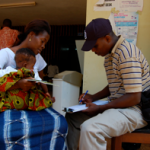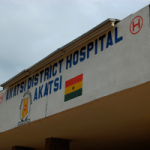When I first visited Akatsi in 2008 my vision was to start a clinic in the town center. I had always dreamed of starting a clinic in the developing world. The problem with forming a ‘vision’ before you’ve actually seen a place is that it isn’t much of a vision.
After speaking with Ghanaians in Akatsi and the outlying villages and seeing the health infrastructure that already existed in the towns, it became obvious to me that another clinic was not what they needed. It was the rural areas that were struggling.
Olivia had been to Ghana the year prior, in the summer/fall of 2007, and she worked on a health worker program. It seemed that was what Akatsi needed. They did not need more doctors, they needed more health workers.
Here is an excerpt from the Partners In Health web-site and who better than Paul Farmer to sum up what we believe.
In a recent article in PLOS Medicine, more than 200 experts were asked the question, “Which single intervention would do the most to improve the health of those living on less than $1 per day?”
Here is Paul Farmer’s reply:
“Hire community health workers to serve them. In my experience in the rural reaches of Africa and Haiti, and among the urban poor too, the problem with so many funded health programs is that they never go the extra mile: resources (money, people, plans, services) get hung up in cities and towns. If we train village health workers, and make sure they’re compensated, then the resources intended for the world’s poorest—from vaccines, to bednets, to prenatal care, and to care for chronic diseases like AIDS and tuberculosis—would reach the intended beneficiaries. Training and paying village health workers also creates jobs among the very poorest.”




